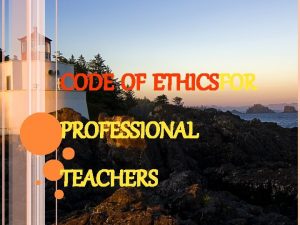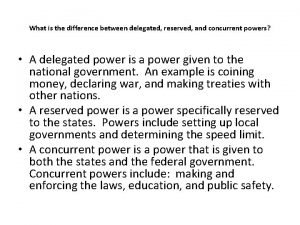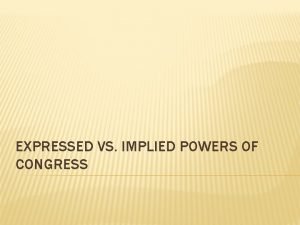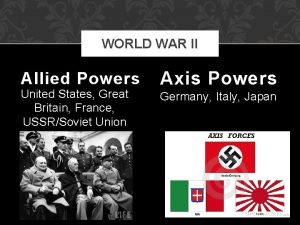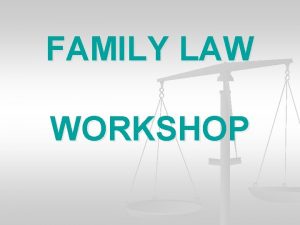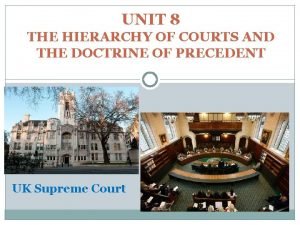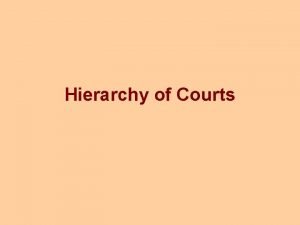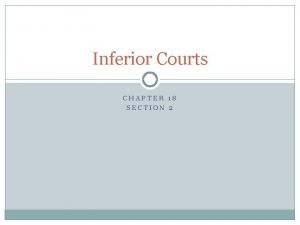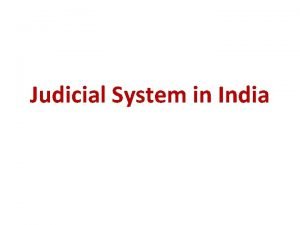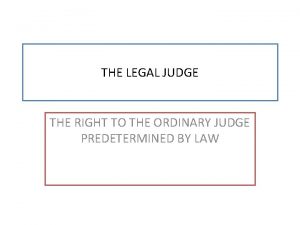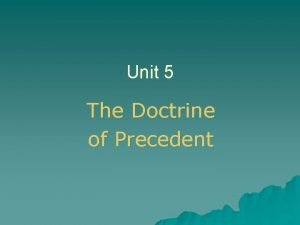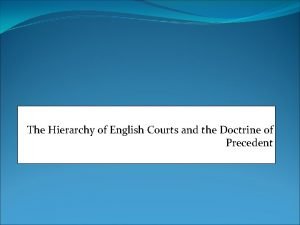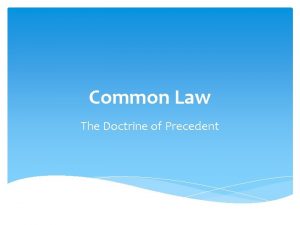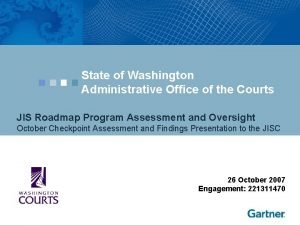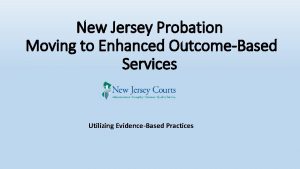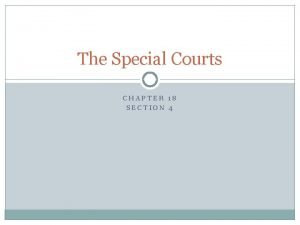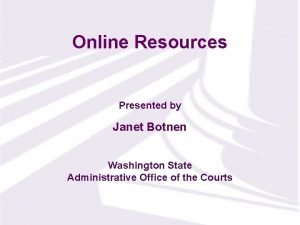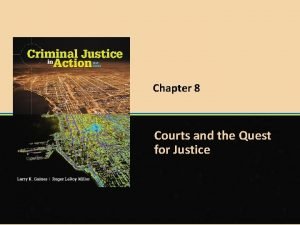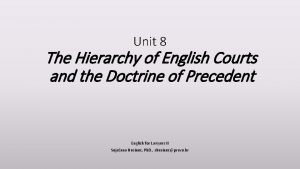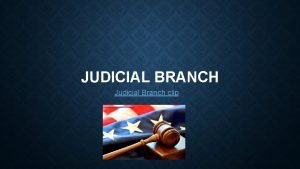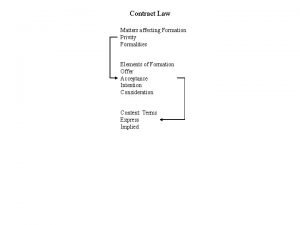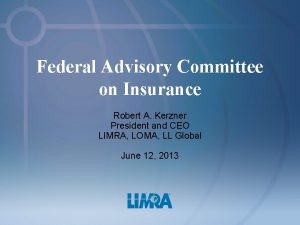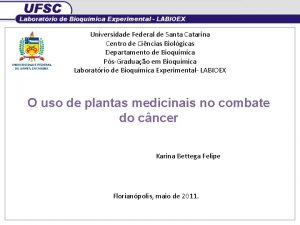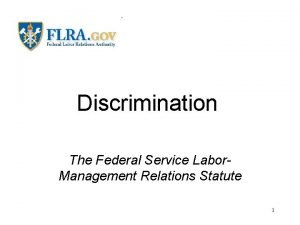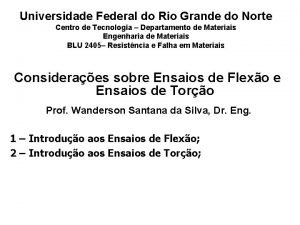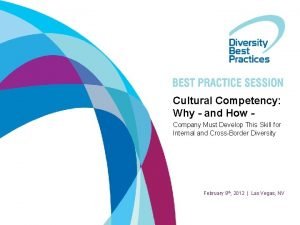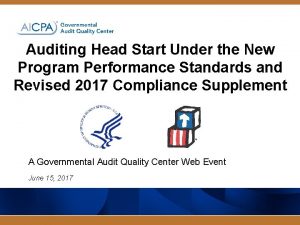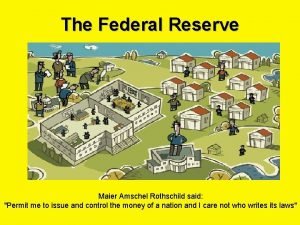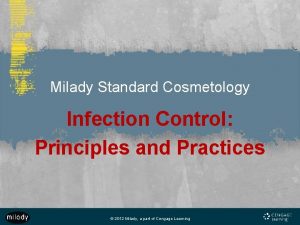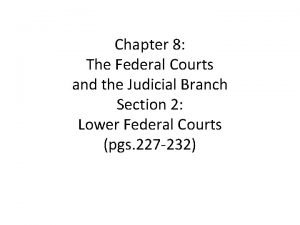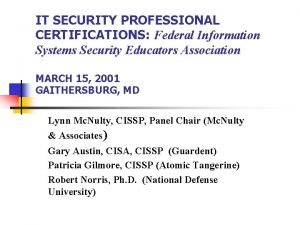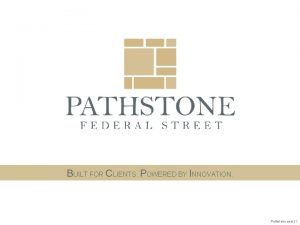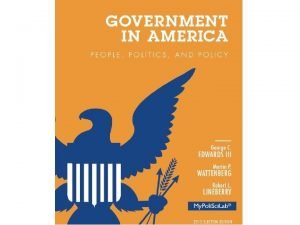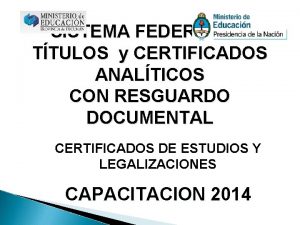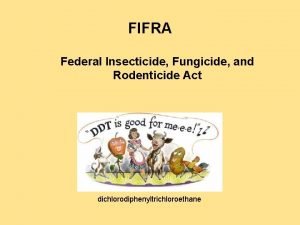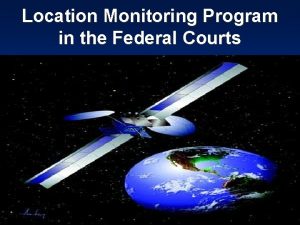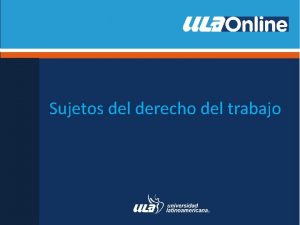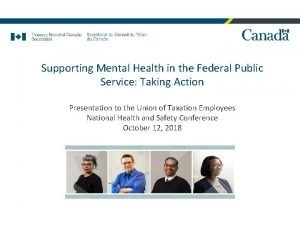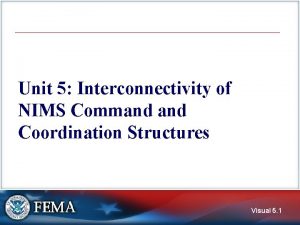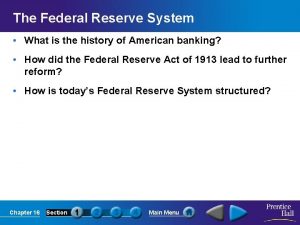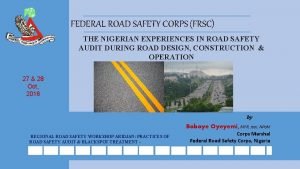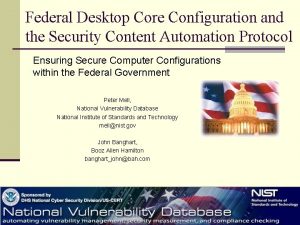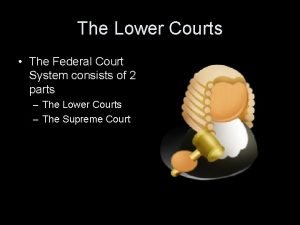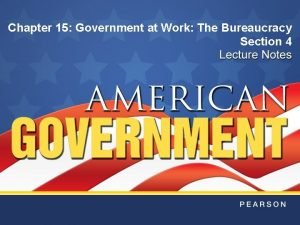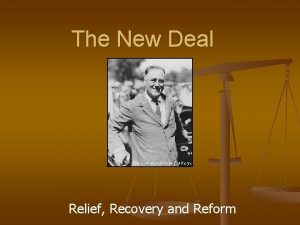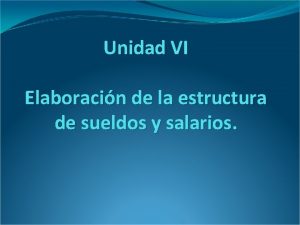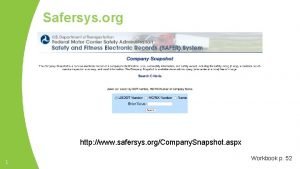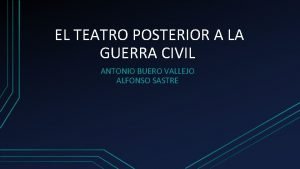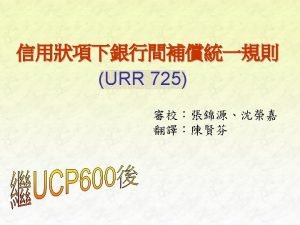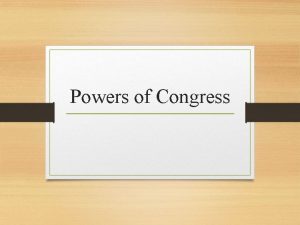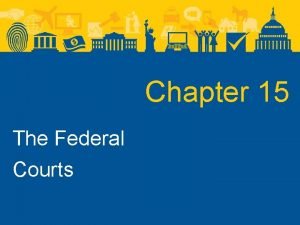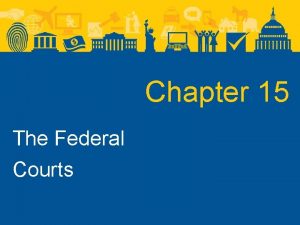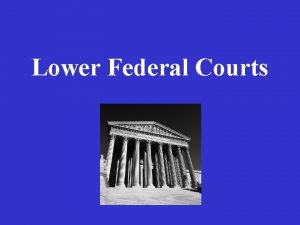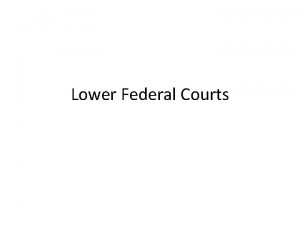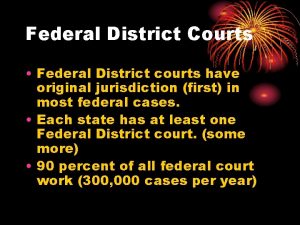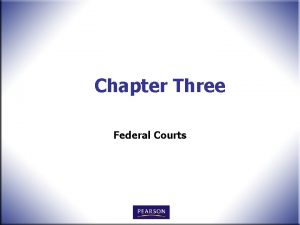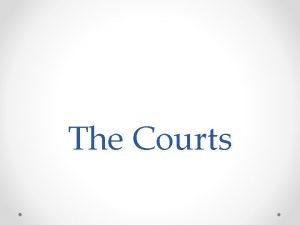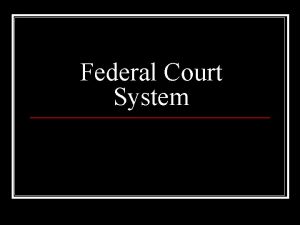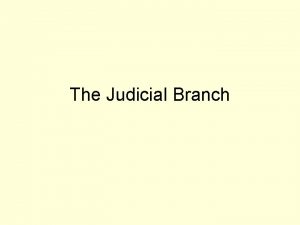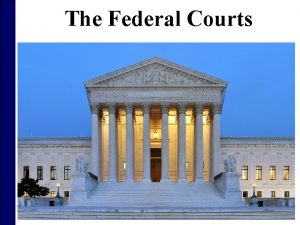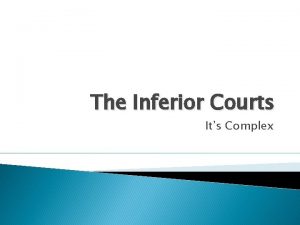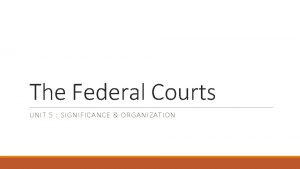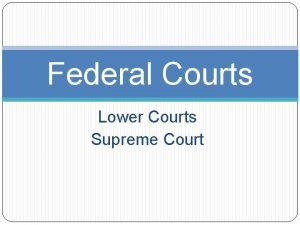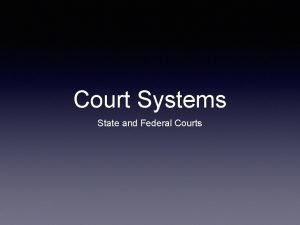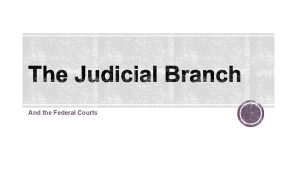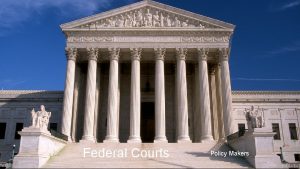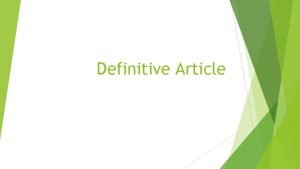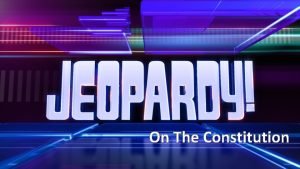Article III Powers of Federal Courts Powers of































































- Slides: 63

Article III Powers of Federal Courts

Powers of Federal Court – An Overview Article III of the Constitution creates the Judicial Branch and establishes the Judicial Powers Consists of three sections - Section I – Formation - Judiciary Act of 1789 also important in the formation of the court - Section II – Jurisdiction - Section III - Treason

Article III § 1: Formation The judicial power of the United States, shall be vested in one Supreme Court, and in such inferior courts as the Congress may from time to time ordain and establish. The judges, both of the supreme and inferior courts, shall hold their offices during good behaviour, and shall, at stated times, receive for their services, a compensation, which shall not be diminished during their continuance in office.

Article III § 1: Formation Applies to the “judicial power” of the United States One Supreme Court Congress has power to establish inferior Courts

Article III § 1: Formation Judges Can and Justices hold their offices during good behaviour …unless they are impeached and convicted by Congress, resign or retire.

Article III § 1: Formation Judges and Justices Samuel Chase, 1804 Impeached by House (acquitted in the Senate) Big effects…

Article III § 1: Formation Judges and Justices William O. Douglas Subject of investigation/hearings in 1953 and 1970 (Rosenberg and Parvin matters)

Article III § 1: Formation Judges and Justices No means for removing a justice who is ill or incapacitated Can receive compensation for services Cannot be diminished during time of service Current salaries?

Article III § 1: Formation What’s missing from Article III regarding the Supreme Court? Judiciary act of 1789 Set number of Supreme Court justices at 6 Created 13 judicial districts within the 11 states Established a circuit court and district court in each judicial district Contained jurisdictional provisions

Article III § 1: Formation Judiciary act of 1789 Contained a clause granting the Supreme Court the power to issue writs of mandamus outside its appellate jurisdiction What happened?

Article III § 2: Supreme Court Jurisdiction Supreme Court has original jurisdiction (not exclusive): Cases affecting Ambassadors/other public Ministers and Consuls Cases in which a State shall be Party Supreme Court has appellate jurisdiction in all other cases (as Congress dictates)

Article III § 2: Jurisdiction If an Ambassador is accused of a crime, can he/she request a trial by jury before the Supreme Court? Georgia v. Brailsford, 3 U. S. 1 (Dall. ) (1794)?

Article III § 2: Federal Court Jurisdiction When does a federal court have jurisdiction? Cases arising under: Constitution Federal Treaties Laws

Article III § 2: Federal Court Jurisdiction When does a federal court have jurisdiction? Cases affecting ambassadors/other public ministers and consuls Admiralty and maritime cases Controversies to which the United States shall be a Party

Article III § 2: Federal Court Jurisdiction When does a federal court have jurisdiction? Controversies between: Two or more States Citizens of different States Citizens of the same State claiming Lands under Grants of different States A State, or the Citizens thereof, and foreign States, Citizens or Subjects

Article III § 2: Federal Court Jurisdiction Originally applied to controversies between “A State and citizens of another State” Superceded “The by Amendment 11 Judicial power of the United States shall not be construed to extend to any suit in law or equity, commenced or prosecuted against one of the United States by Citizens of another State, or by Citizens or Subjects of any Foreign State. ”

Article III § 2: Federal Court Jurisdiction Trial of crimes Done by jury Crimes tried in State where crime has been committed If the crime was not committed within any State, Trial is conducted where Congress directs

Article III § 3: Treason against the United States, shall consist only in levying war against them, or in adhering to their enemies, giving them aid and comfort. No person shall be convicted of treason unless on the testimony of two witnesses to the same overt act, or on confession in open court. The Congress shall have power to declare the punishment of treason, but no attainder of treason shall work corruption of blood, or forfeiture except during the life of the person attainted.

Article III § 3: Treason consists “only” in levying war against United States or “in adhering to their Enemies, giving them Aid and Comfort” Can include providing arms, troops, transportation, shelter, or classified information

Article III § 3: Treason Requires: Testimony of two witnesses to the same overt act, or Confession in open Court

Article III § 3: Treason Punishment Congress has power to declare the punishment of treason (18 U. S. C. A. § 2381) Death, or Minimum penalty of five years in prison and a $10, 000 fine

Article III § 3: Treason “No attainder of treason shall work Corruption of Blood, or Forfeiture except during the Life of the Person attainted. ” Descendants of someone convicted for treason cannot be considered “tainted” by treasonous ancestor Congress may confiscate the property of a traitor, but that property must be inheritable at the death of the person convicted

Doctrine of Justiciability Constitutional and prudential limitation on the Court’s power to hear and decide cases Ex: Article III, Sec. 2 defines the federal judicial power in terms of “cases” and “controversies” Prudential review – “policy” militates against judicial

Justiciability Capable of being decided by legal principles or by a court of justice Includes: Prohibition against advisory opinions Standing Ripeness Mootness Political question doctrine

Justiciability Each of the justiciability doctrines are aimed at conserving judicial resources by addressing actual “cases and controversies”

Prohibition Against Advisory Opinions What An is an advisory opinion? opinion issued by a court to a legislative or executive entity providing an opinion as to the constitutionality of a proposed action or pending legislation

Prohibition Against Advisory Opinions Why no advisory opinions? Separation of powers maintained by keeping court out of legislative process Court is interested in resolving actual disputes, not hypothetical questions on issues that may or may not ever arise

Prohibition Against Advisory Opinions How to avoid advisory opinion… Must be actual adversarial dispute/real controversy

Standing Whether a person is a proper party to bring a matter before a court for adjudication To have standing means that a person or entity is legally entitled to have a court decide the merits of their dispute or defense

Standing Requirements Imminent harm to the person or entity, or injury already suffered Harm or injury is fairly traceable to defendant’s conduct (causation) Favorable decisions is likely to redress harm or injury (redressability)

Standing Requirements Party must assert redress for injury that has occurred to him or her cannot raise claims of third parties plaintiff may not simply sue as a taxpayer More than a mere interest in a problem

Standing Exceptions to prohibition against raising claims of third parties… 1. Where third party is unlikely to be able to sue Barrows v. Jackson, 346 U. S. 249 (1953) (racially restrictive covenant)

Standing Exceptions to prohibition against raising claims of third parties… 2. The overbreadth doctrine Secretary of State of Maryland v. J. H. Munson Co. , 467 U. S. 947 (1984) (charitable organization case) Appears to be limited to First Amendment cases

Standing Exceptions to prohibition against raising claims of third parties… 3. Exception for Associations Association can seek redress for itself or its members Three things must be present: If an individual member has standing to sue on their own (think Sierra Club v. Morton – more than a mere interest; point to someone affected); Interest is germane to the organization’s purpose; The claim doesn’t require participation in the lawsuit of an individual member

Ripeness Refers to fact that actual controversy does not exist because the harm asserted by the plaintiff has not yet occurred If controversy is too early, then injury may be speculative

Mootness Refers to fact that actual controversy does not exist because the controversy has terminated

Mootness What kind of circumstances can render a case moot? Death of claimant Settlement of claim Repeal of law

Mootness: Exceptions Collateral consequences (criminal matters) Continuing injury (civil matters)

Mootness: Exceptions Wrongs Review Capable of Repetition Yet Evading Typically involves situations where wrong will necessarily be resolved before time it takes to be addressed in federal court Must be reasonable expectation that the same complaining party will be subject to the same action again Roe v. Wade, 410 U. S. 113 (1973)

Mootness: Exceptions Voluntary Cessation Occurs when defendant voluntarily ceases the improper behavior but is free to return to it at any time Class Actions

Political Question Doctrine Invoked when a court refuses to decide an issue because it properly belongs to the decision-making authority of elected officials Concerned with subject matter that the Court is being asked to review

Political Question Doctrine Luther v. Borden, 48 U. S. 1 (1849) Did the Court have the constitutional authority to declare which group constituted the official government of Rhode Island? No, Article IV § 4 says its up to the 'United States', not the courts

Political Question Doctrine Nixon v. U. S. , 506 U. S. 224 (1993) Do courts have authority to review procedures used by U. S. Senate in impeachment proceedings? No this is a political question committed to legislative branch

Political Question Doctrine What is the benefit of the Political Question Doctrine? What problems exist with the Political Question Doctrine?

REVIEW – ARTICLE III, SEC. 1 “Judicial Power” is vested in one Supreme Court and all inferior courts that Congress creates Hold office for as long as they engage in “good behavior” Cannot reduce compensation once take office

REVIEW – ARTICLE III, Sec. 2 Federal Court jurisdiction: Cases arising under: Constitution Federal Laws Treaties Cases affecting Ambassadors Maritime U. S. a party Between two or more states Citizens of different states Citizen claiming land through grant from another state

REVIEW – ARTICLE III, Sec. 2 Supreme Court Original Jurisdiction: Ambassador State a party Supreme As Trial a party Court Appellate Jurisdiction: Congress mandates for crimes done by a jury

REVIEW – ARTICLE III, Sec. 3 Treason consists “only” in levying war against United States or “in adhering to their Enemies, giving them Aid and Comfort” Requires: Testimony of two witnesses to the same overt act, or Confession in open Court Punishment: Death Imprisonment for minimum of five years and $10, 000 fine

REVIEW - JUSTICIABILITY Justiciability: aimed at conserving judicial resources by addressing actual “cases and controversies Includes: Prohibition against advisory opinions Standing Ripeness Mootness Political question doctrine

Hypothetical Is there standing? : Jane wants to prevent the Humane Association from adopting out sick animals. Jane has never adopted an animal from the Humane Association. Does Jane have standing to sue the Humane Association.

Hypothetical Answer No. Remember the requirements of standing: Imminent harm to the person or entity, or injury already suffered Harm or injury is fairly traceable to defendant’s conduct (causation) Favorable decisions is likely to redress harm or injury (redressability) Party must assert redress for injury that has occurred to him or her Jane can likely meet one, two and three, but she cannot meet number 4. As a result, she does not have standing.

Hypothetical Is this issue justiciable? : Congress is going to pass a bill legalizing marijuana. However, before passing the bill, Congress sends a request to the Supreme Court to ask if they believed the bill was constitutional as written.

Hypothetical Answer No. Prohibition against advisory opinions.

Hypothetical Is there standing? : John is sentenced to death for murder. John decides to forego challenging his death sentence. His mother, however, files a suit challenge her son’s death sentence.

Hypothetical Answer No. She does not meet the four elements of standing. Plus, the third-party standing exception does not apply because John could challenge the sentence.

Hypothetical Is this claim justiciable? An act passed by Congress prohibited federal employees from engaging in political activity. Federal employees filed a suit seeking to declare the act unconstitutional. While the federal employees had not engaged in any political activity yet, they submitted a list of activities they wanted to engage in.

Hypothetical Answer No. The claim is not ripe. They need to suffer an injury before the Court can review whether the act is unconstitutional to the specific activities they actually engage in.

Hypothetical Is this claim justiciable? Bob sues neighbor over discharges into a water stream that forms the property boundary, claiming the discharge violates the Clean Water Act. Neighbor contests that there is a violation of the Clean Water Act and says he will stop discharging. He wants the Court to dismiss the claim as moot. Is it moot?

Hypothetical Answer No. The claim is not moot because it is capable of being repeated. Further, if the defendant is free to resume the activity, it is not moot. “Voluntary cessation” exception.

Hypothetical Jane is indicted for treason. At trial, there is one witness that testifies that they saw her selling nuclear codes to the Cubans. After this testimony, the Prosecution rests. Jane moves for a directed verdict arguing that the Prosecution has failed to meet the requirements of establishing treason. You are the judge. How do you rule?

Hypothetical Answer Case dismissed. Treason requires the testimony of “two” witnesses or an open court confession. There was only one witness who testified in this matter.

Hypothetical IRS changed a ruling that limited the amount of free medical care a hospital could provide. This change was challenged by a number of plaintiffs that were low income families that relied upon this free medical care alleging that they are now being denied free medical care.

Hypothetical Answer No standing. Plaintiffs could not establish that the policy was causing the denial of the medical care or whether it was a hospital decision.
 Hamlet act iii scene iii
Hamlet act iii scene iii Code of ethics article xi
Code of ethics article xi Allied and central powers
Allied and central powers How do delegated, reserved, and concurrent powers differ?
How do delegated, reserved, and concurrent powers differ? Implied powers vs expressed powers
Implied powers vs expressed powers Congress informal powers
Congress informal powers Implied vs enumerated powers
Implied vs enumerated powers Was the united states on the axis powers or allied powers?
Was the united states on the axis powers or allied powers? Implied power
Implied power [email protected]
[email protected] England hierarchy
England hierarchy Hierarchy of criminal courts in india
Hierarchy of criminal courts in india Chapter 18 section 2 the inferior courts answer key
Chapter 18 section 2 the inferior courts answer key Judicial hierarchy in india
Judicial hierarchy in india The indolent judge
The indolent judge Courts hierarchy
Courts hierarchy British court hierarchy
British court hierarchy Court meta 90mspanglervariety
Court meta 90mspanglervariety Court hierarchy
Court hierarchy Washington administrative office of the courts
Washington administrative office of the courts Juliet oh juliet where art thou
Juliet oh juliet where art thou New jersey courts
New jersey courts The special courts
The special courts Inside courts wa
Inside courts wa 4 levels of state courts
4 levels of state courts Hierarchy of english courts
Hierarchy of english courts Structure of the court system
Structure of the court system Decide whether each description fits trial courts only
Decide whether each description fits trial courts only Squash court wolverhampton
Squash court wolverhampton When will the courts imply terms into a contract
When will the courts imply terms into a contract Arizona fare payment
Arizona fare payment Robert kerzner
Robert kerzner Angiogênese
Angiogênese Federal service labor management relations statute
Federal service labor management relations statute Federal reserve omaha
Federal reserve omaha Universidade federal do rio grande do norte
Universidade federal do rio grande do norte Debra nelson mgm
Debra nelson mgm Universidade federal de santa catarina
Universidade federal de santa catarina Sf-429 head start
Sf-429 head start Rothschild and federal reserve
Rothschild and federal reserve Standard precautions milady
Standard precautions milady Federal health architecture
Federal health architecture Rsoo
Rsoo Federal district court map new york
Federal district court map new york Federal information
Federal information Pathstone family office llc
Pathstone family office llc Civil service seeing the big picture example
Civil service seeing the big picture example Sistema federal de títulos 2020
Sistema federal de títulos 2020 Federal insecticide, fungicide, and rodenticide act (fifra)
Federal insecticide, fungicide, and rodenticide act (fifra) Federal location monitoring program
Federal location monitoring program Sujetos colectivos ley federal del trabajo
Sujetos colectivos ley federal del trabajo Federal public service workplace mental health strategy
Federal public service workplace mental health strategy Nims command and coordination structures
Nims command and coordination structures Objectives of flower arrangement
Objectives of flower arrangement Ferderal reserve
Ferderal reserve Frsc vision and mission statement
Frsc vision and mission statement The fed today video questions answers
The fed today video questions answers Federal desktop core configuration
Federal desktop core configuration Federal court system structure
Federal court system structure Chapter 15 section 1 the federal bureaucracy
Chapter 15 section 1 the federal bureaucracy Fha new deal: relief, recovery, reform
Fha new deal: relief, recovery, reform Habitaciones para los trabajadores ley federal del trabajo
Habitaciones para los trabajadores ley federal del trabajo Safer company snapshot
Safer company snapshot Teatro posibilista
Teatro posibilista

